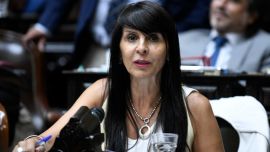Few government officials attended Argentina's annual IDEA forum during the 12 years of the Kirchner presidencies, including during the five years that Alberto Fernández was Cabinet Chief.
But at the recent prequel to the event in Neuquén, presidential candidate Alberto Fernández sent economic adviser Guillermo Nielsen. Times have changed. But how new will they be in terms of Argentina's relationship with the International Monetary Fund?
"There are two variables", Nielsen told this journalist. "One, in this context of fiscal over-stretching that has led the Treasury to rely on the tools of the Central Bank. How many dollars will each entity have at the end of the year? Two, what will be the real productive capacity and the reactive capacity of the economy by December 31? Because they [the Macri government] are breaking all records in terms of AFIP [tax bureau] embargos against companies that are about to explode", Nielsen said.
"Whatever the electoral result, we must renegotiate with the [International Monetary] Fund", the former Finance secretary to Eduardo Duhalde and Néstor Kirchner explained.
"In 2022, the level of expirations will be unplayable. If you check the details, which have been left to the side, you must refinance the payments with an agreement to extend the terms, which will put pension reform at the heart of the matter. It [pension reform] is the most significant area of public spending and with the most aggressive indexation. It's a huge problem and Argentina must resolve it", Nielsen insisted.
"There will also be other issues like the tax structure, which is catastrophic", he added.
"An agreement to extend the terms has good and bad factors. Look at the long term, the debate then moves from the structure of the Argentine economy, because of hard problems which were not resolved by this government. It includes labour reform. The [IMF's] stand-by programmes, like the current one, only address how to pay", he added.
But is Fernández in favour of pension and labour reform? "One thing is to carry out reform in recession and another is in times of growth. We want to put the country back on track towards growth. If you have growth, you have a primary fiscal surplus [before paying the debt]. The ability to pay depends on how the renegotiation plays out with the [International Monetary] Fund, convincing them that the it will be paid if the economy grows", he added.
And how does it grow? "I'll give an example", Nielsen responded. "We've been working on a new regularity framework to formulate non-conventional hydrocarbons in Argentina, which there are six of, including Vaca Muerta, and which involve offering the same conditions as Permian and Marcellus", he said, in reference to "two vacas muertas" that the United States developed to restore its self-sufficiency in energy.



















Comments